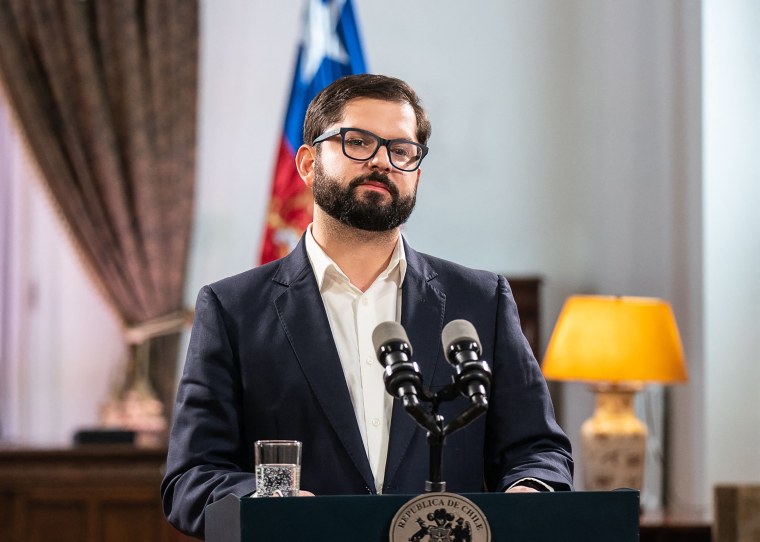Chileans have dealt a blow to young President Gabriel Boric after rejecting a new progressive constitution to replace the dictatorship-era charter. Although the proposed charter was expected to be defeated in Sunday's referendum, the rejectionist camp compiled a nearly 24-point victory, a shock defeat in a document billed as a democratic effort to replace the three-year-old and enacted constitution. By general Augusto Pinochet 41 years ago. With 99.9% of votes counted, the rejection camp had 61.9% support compared to 38.1% for approval amid heavy turnout with long queues at polling stations. Voting was mandatory. Boric, who lobbied hard for the new document, said the results showed that the Chilean people “were not satisfied with the constitutional proposal that the Convention presented to Chile." The president said there will now be "adjustments to our governing team" as they try to find a way forward. Despite the loss, analysts said a large majority believed the current constitution should be changed and felt the proposed constitution was not a suitable replacement. Borick explained that the process of revising it will not end with Sunday's vote. He said leaders need to work "with more determination, more dialogue, more respect" to reach a new proposed charter that will unite us as a country." Chilean President Gabriel Boric addresses the nation after Chileans overwhelmingly rejected the proposed new constitution in Sunday's referendum. Marcelo Segura / AFP - Getty Images In Santiago, Chile's capital, there was a honking of horns as groups of people gathered at many intersections to celebrate the results." We're happy, really, we all want a new constitution, but one that's done right and this one that didn't meet the expectations of the majority," said Lorena Cornejo, 34, waving a Chilean flag. “Now we must work for a new one that unites us, he did not represent us and that was clear in the vote." Even some who were in favor of the proposed document were optimistic about the defeat. "Although it's true that I want to approve it, this is a new opportunity to reform everything that people disagreed with," said 36-year-old Alain Olivares."We will have to wait longer to change the constitution." Carlos Salinas, a spokesman for the House of Citizens for Rejection, said the majority of Chileans see rejection as a "path of hope." Despite expectations of defeat for the proposed charter, no analyst or pollster had predicted such a large margin for the rejectionist camp, showing how unwilling Chileans are to support what could be one of the world's most progressive charters. Fundamentally changed the South American country. The constitution was written by a consensus that was the first in the world to be evenly split between male and female representatives, but critics said it was too long, lacked clarity and went too far in some of its measures that characterized Chile as a multinational state. Prioritizing the environment and gender equality. The proposed charter of 388 articles also introduced rights to free education, health care and housing. It would establish independent indigenous territories and recognize a parallel justice system in those areas, but lawmakers will decide how far that goes. In contrast, the current constitution is a market-friendly document that favors the private sector over the government in areas such as education, pensions and health care. It also makes no mention of the country's indigenous population, which is about 13% of the population. The vote marked the culmination of a process that began when the country was once seen as a paragon of stability in the region during student-led street protests in 2019. The unrest was sparked by public transport fare hikes but quickly spread. Broader demands for greater equality and greater social security. Boric, 36, is Chile's youngest president and a former student protest leader. He tied his fortunes so closely to the new document that analysts said some voters may see the referendum as a referendum on his government at a time when his approval ratings have fallen since he took office in March. What happens now is a big question mark. Chilean political leaders at all levels agree that the constitution, which dates back to the country's 1973-1990 dictatorship, needs to change. The process by which a new resolution will be chosen to be written has yet to be decided and will be the subject of intense discussions among the country's political leadership. Borik has asked all political party leaders for a meeting tomorrow to decide the way forward.
Translate
Followers
Featured Post
The Best Way To2 Invest In Your Business?
Admin
December 10, 2022
The Best Way To2 Invest In Your Business? Photo by nattanan23 on Pixabay There …
Popular Posts

Zelensky: Mass burial site found in Ukrainian Izyum after recapture
September 15, 2022
Ad Space
Popular Posts

Gibraltar is officially a city - 180 years late
August 28, 2022

Roland Mesnier: Former White House pastry chef dies at 78
August 28, 2022




0 Comments